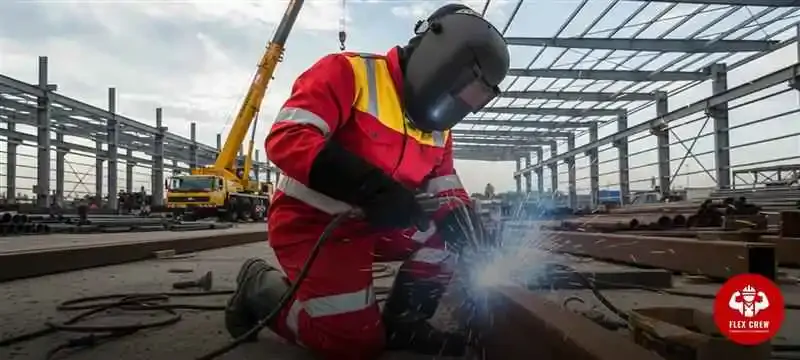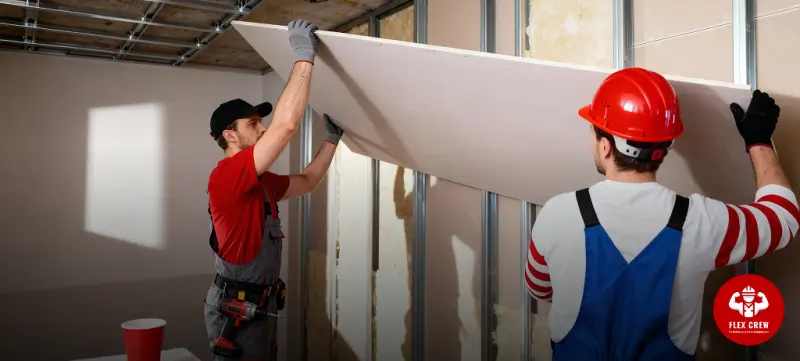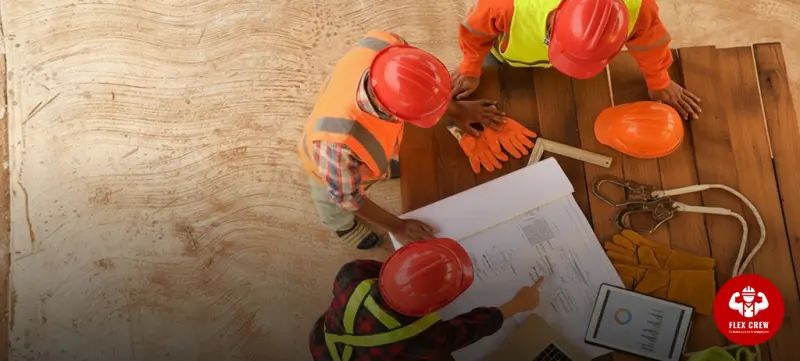You know that sinking feeling when you're halfway through a project and realize you've got the wrong crew mix? Maybe your electrical team is waiting on plumbers, your concrete crew is twiddling their thumbs because permits got delayed, or worse – you're paying overtime rates because poor planning left you scrambling at the last minute.
Here's the truth most contractors learn the hard way: construction project staffing isn't about having warm bodies on site. It's about having the right people, with the right skills, at precisely the right moment. Companies that master this aren't just finishing projects on time – they're consistently coming in under budget while their competitors wonder where their profits went.
What Makes Construction Project Staffing Different
Construction project staffing has unique challenges that office-based businesses never face. You're dealing with weather delays, permit holdups, safety requirements, trade coordination, and clients who change their minds. Your workforce needs shift dramatically from phase to phase, and one wrong staffing decision can cascade through your entire timeline.
Smart construction project staffing strategy addresses these challenges before they become expensive problems. It's the difference between reactive crisis management and proactive profit optimization.
The Hidden Costs of Poor Project Staffing When construction project staffing goes wrong, you don't just pay wages – you pay for rework, safety incidents, delayed timelines, frustrated clients, and missed opportunities for future work. These hidden costs can easily double your actual labor expenses.
Strategic Workforce Planning Across Project Phases
Successful construction project staffing starts with understanding that every project phase has specific workforce requirements. Planning these requirements strategically eliminates the expensive last-minute scrambles that kill margins.
Foundation and Site Preparation Phase
Your construction project staffing strategy here focuses on heavy equipment operators, site supervisors, and concrete specialists. These trades set the pace for everything that follows, so this isn't where you cut corners or hope for the best. Plan for weather delays and have backup operators identified before you need them.
Structural and Framing Phase
Construction project staffing during framing requires experienced carpenters who can work quickly and accurately. This phase often determines your overall timeline, so having the right skill mix is critical. Consider apprentice-to-journeyman ratios carefully – too many apprentices slow things down, too few miss training opportunities.
Systems Installation Phase
Multiple trades working simultaneously create coordination challenges that smart construction project staffing addresses proactively. Electrical, plumbing, and HVAC teams need careful scheduling to avoid conflicts while maintaining productivity.

Finishing and Closeout Phase
Construction project staffing for finishing work requires attention to quality and detail. This phase often gets rushed, but having skilled finish carpenters, quality inspectors, and project coordinators prevents costly callbacks and unhappy clients.
Resource Optimization: Getting Maximum Value From Every Worker
Effective construction project staffing isn't about having more people – it's about eliminating waste and maximizing productivity. The best contractors understand that overstaffing can actually slow projects down and increase costs.
Cross-Training Your Core Team
Smart construction project staffing includes developing versatile team members. When your framers understand basic electrical rough-in or your plumbers know HVAC basics, you eliminate expensive waiting periods and improve coordination between trades.
Flexible Crew Sizing
Rather than maintaining large crews through every phase, effective construction project staffing scales teams based on actual needs. Start with core specialists and add support as required, keeping labor costs predictable while maintaining quality standards.
Strategic Specialist Integration
Some construction work requires true experts, but not for entire project durations. Bringing in specialists for complex installations – like specialty concrete work or advanced electrical systems – often costs less than trying to train regular crews or maintaining full-time specialists you can't keep busy.
Cost Control Through Strategic Project Staffing
Real cost control in construction project staffing means understanding productivity rates, not just hourly wages. Companies that track actual productivity per completed task make better staffing decisions and more accurate bids.
Labor Cost Forecasting
Effective construction project staffing includes realistic productivity planning. Factor in learning curves for new team members, coordination time between trades, weather delays, and the inevitable project changes that affect workforce needs.
Overtime Management
Strategic construction project staffing anticipates crunch periods and builds realistic schedules. Planned overtime for meeting deadlines can be cost-effective. Unplanned overtime due to poor staffing decisions is just expensive chaos.
Hidden Cost Elimination
Poor construction projectstaffing decisions create costs beyond wages. Wrong people in wrong roles lead to rework, safety issues, delays affecting other trades, and damaged client relationships. Getting staffing right the first time eliminates these profit killers.
Scalability: Growing Your Construction Business Smart
Companies that scale successfully in construction don't just add more crews – they develop systems for managing growth. Scalable construction project staffing means handling bigger projects without compromising quality or profitability.
Building Your Project Staffing Foundation
Identify top performers and develop them into crew leaders and project supervisors. These people become the backbone for handling multiple projects and larger scopes simultaneously.
Flexible Workforce Networks
Maintain relationships with qualified contractors and specialists you can integrate into projects as needed. This approach provides access to skilled labor without the overhead of permanent employees you can't keep busy year-round.
Documented Processes
When experienced team members develop efficient approaches to complex tasks, document these methods. Scalable construction project staffing depends on replicating success across multiple crews and projects.
Risk Management in Construction Project Staffing
Construction projects never go exactly as planned. Weather delays, permit issues, client changes, and equipment problems are industry realities. Smart construction project staffing builds flexibility into workforce planning to handle these challenges.
Skills Gap Insurance
What happens when key team members get injured, quit, or become unavailable mid-project? Effective construction project staffing includes cross-training and backup specialist relationships to prevent these situations from becoming disasters.
Weather and Seasonal Adaptability
Plan for weather delays by having indoor and outdoor work alternatives ready. Construction project staffing strategy might include interior specialists available when exterior work gets delayed, or flexibility to move crews between different project phases.
Change Order Management
Scope changes and client modifications are construction realities. Having a construction project staffing approach that adapts to these changes without destroying budgets separates professional contractors from those struggling with profitability.
How FlexCrewUSA Transforms Construction Project Staffing
All this strategic planning sounds great, but here's the practical challenge – where do you find qualified people exactly when your construction project staffing plan calls for them? Traditional hiring takes too long, temp agencies don't understand construction quality standards, and your network might not always be available.
FlexCrewUSA solves the practical implementation of strategic construction project staffing. When you need experienced specialists for specific phases, commercial electricians who understand complex systems, or concrete finishers for specialty applications, you need them fast and skilled.
The platform connects you with pre-vetted construction professionals who understand quality standards and project urgency. It's like having a bench of proven specialists ready to step into your projects exactly when your construction project staffing strategy requires specific skills.
Frequently Asked Questions About Construction Project Staffing
How early should I start planning construction project staffing?
Start during bidding, 4-6 weeks before project start. Early planning secures specialists without premium rates and gives competitive advantage in tight labor markets.
What's the biggest construction project staffing mistake contractors make?
Treating all construction workers as interchangeable. A finish carpenter isn't a framing specialist. Using people outside their expertise wastes money on wages and rework.
How do I balance permanent crews with flexible construction project staffing?
Keep a core team of versatile, quality people. Use flexible staffing for specialized skills, peak periods, and projects requiring expertise your permanent crew lacks.
Should construction project staffing include cross-training or just specialists?
Both. Cross-train core teams for flexibility, but bring specialists for complex tasks. A plumber with basic electrical knowledge helps coordination, but licensed electricians handle complex electrical work.
How do I handle construction project staffing when projects overlap?
Plan crew transitions during bidding and maintain contractor relationships. Document processes so temporary team members integrate quickly while maintaining quality standards.
What's the best way to control construction project staffing costs?
Track productivity rates by phase and trade, not just wages. Understanding actual productivity costs improves staffing decisions and bid accuracy.
How do I find reliable contractors for specialized construction project staffing needs?
Build relationships before you need them. Vet contractors during slower periods. FlexCrewUSA provides pre-vetted specialists, eliminating risks with unknown contractors.
What should I do when key construction project staffing changes happen mid-project? Have succession plans for critical roles. Cross-train team members and maintain backup specialist relationships. Document processes for quick replacement integration.
How do I optimize construction project staffing crew sizes?
Start with essential specialists and add support as needed. Monitor productivity and adjust based on performance. Smaller, skilled crews often outperform larger mixed-skill teams.
Is local hiring better for construction project staffing?
Local hiring reduces costs and builds relationships. Specialized skills might require outside contractors. Factor travel, accommodation costs, and project duration when deciding.
Making Construction Project Staffing Work for Your Business
The construction industry will always have challenges – labor shortages, weather delays, demanding clients, tight margins. But companies that implement strategic construction project staffing consistently outperform those making staffing decisions on the fly.
Smart construction project staffing strategy isn't just about having enough people – it's about having the right people with the right skills exactly when you need them, without breaking your budget. When competitors scramble for last-minute solutions, you'll execute a plan that delivers projects on time and under budget.
Construction project staffing done right becomes your competitive advantage. It's the foundation for building a construction business that thrives regardless of market conditions, because you're always prepared with the workforce strategy that matches your project needs.
Ready to stop leaving money on the table with poor construction project staffing decisions? Your next project is the perfect place to start implementing these strategies and seeing the difference strategic workforce planning makes to your bottom line.



